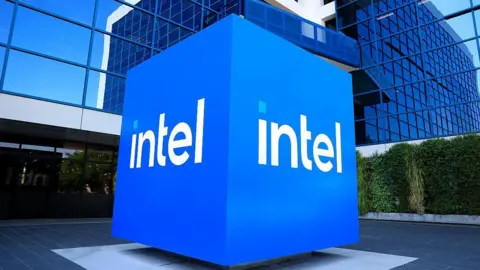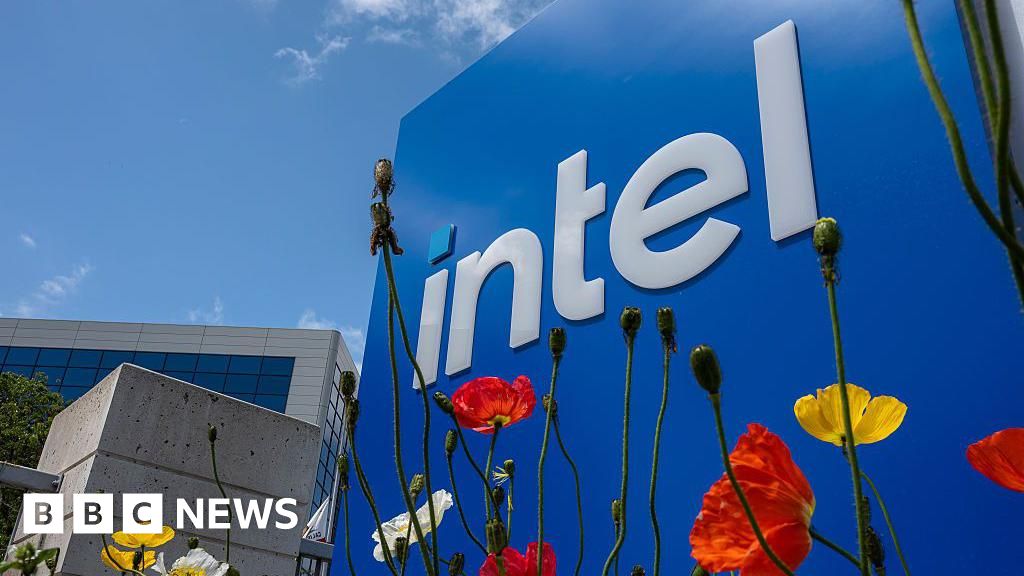 Getty Images
Getty ImagesUS Secretary of Commerce Howard Lutnick said on Friday that the federal government will take a 10% stake in US chipmaker Intel.
“This historic agreement strengthens US leadership in semiconductors, which will both grow our economy and help secure America’s technological edge,” Lutnick wrote on X in a post accompanied by a photo of himself with Intel CEO Lip-Bu Tan.
President Donald Trump revealed the deal earlier on Friday during remarks in the Oval Office, calling it a “great deal for them”.
Shares of the Santa Clara, California-based chipmaker soared more than 5% on Friday.
Intel said in a statement that the US government would make a $8.9bn (£6.6bn) investment in Intel common stock.
The funds were set to come from grants that were previously awarded but not yet paid, Intel said, including monies promised under the US CHIPS and Science Act which was passed during President Joe Biden’s administration.
“As the only semiconductor company that does leading-edge logic R&D and manufacturing in the US, Intel is deeply committed to ensuring the world’s most advanced technologies are American made,” Mr Tan said in a statement.
“President Trump’s focus on US chip manufacturing is driving historic investments in a vital industry that is integral to the country’s economic and national security,” he added.
The CHIPS Act was passed with the aim of reshoring chip manufacturing in the United States.
Intel has struggled in recent years to build out more chip capacity and has fallen far behind rival Nvidia whose market cap has soared past the $4tn mark while Intel’s has languished around $100bn.
The one-time Silicon Valley icon has failed to capitalise on the development of mobile technology and, more recently, artificial intelligence which Nvidia has dominated.
Under attack
Intel had found itself in US President Donald Trump’s crosshairs in recent weeks.
Earlier this month, Trump called on Mr Tan to immediately resign, accusing him of having problematic ties to China.
Trump called Mr Tan “highly conflicted” for alleged investments in companies which the US says are linked to the Chinese military.
Mr Tan referred to the accusations as “misinformation” in a note sent to Intel staff, in which he defended himself and said he had “always operated within the highest legal and ethical standards.”
Mr Tan is a US citizen born in Malaysia and raised in Singapore.
It is legal for Americans to invest in Chinese firms.
Trump’s attack came after Republican Senator Tom Cotton delivered a letter to Intel’s board raising similar concerns and questioning the company’s ability to be a “responsible steward of American taxpayer dollars and to comply with applicable security regulations”.
Mr Tan visited the White House to meet with Trump after the president’s attacks.
A ‘creative idea’
Friday’s announcement comes after White House Press Secretary Karoline Leavitt called the proposal “a creative idea that’s never been done before” earlier in the week.
The Trump administration recently ordered Nvidia and AMD to give the government a 15% cut of the revenue from AI chip sales to China, according to reports.
While the approach is considered unusual, Jacob Feldgoise, a Senior Data Research Analyst at Georgetown University’s Center for Security and Emerging Technology, drew parallels between the equity stake and the previous approach of giving Intel grant funding.
“It’s still in service of the same overall objective which is taking a more direct role in private markets to advance US economic and national security objectives, particularly around maintaining technological leadership – or really regaining it – when it comes to semiconductor manufacturing,” Mr Feldgoise told the BBC.
The deal is considered rare in the modern era, but not without precedent.
During the Great Financial Crisis in 2008, the US government took a majority stake in automaker General Motors which was poised to enter into bankruptcy protection.
It eventually exited its position, incurring a loss of about $10bn.
Mr Feldgoise said the Trump administration took a similar approach earlier this year in a deal with MP Materials, a Nevada-based company that mines rare earth metals.
That agreement has come under scrutiny from public-interest watchdog groups amid revelations that the Department of Defense depended on a Cold War-era law to circumvent procurement and contracting laws.





